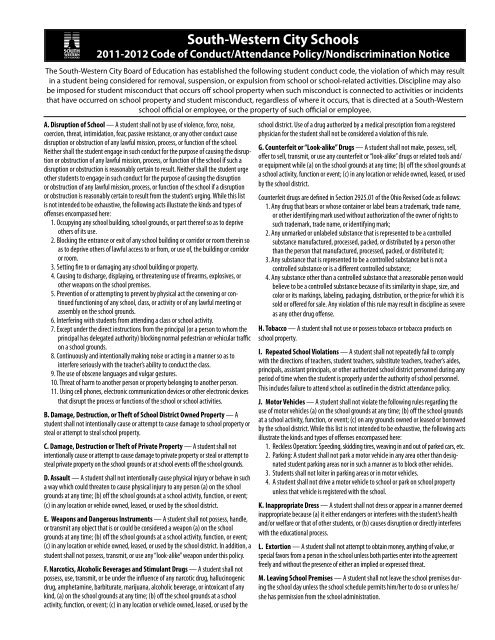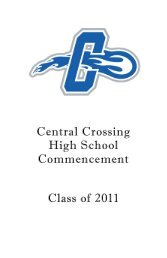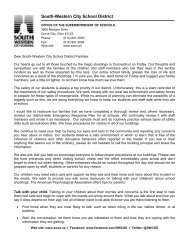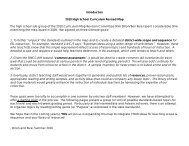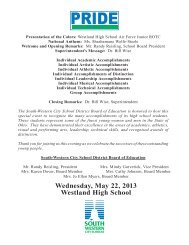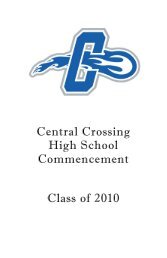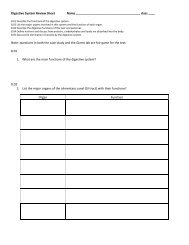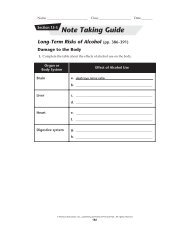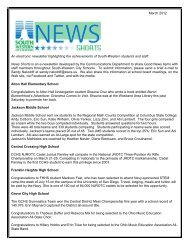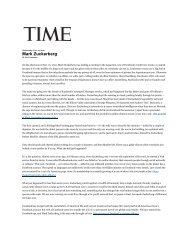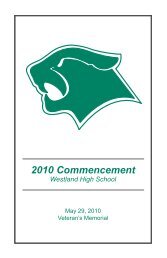South-Western City Schools
South-Western City Schools
South-Western City Schools
Create successful ePaper yourself
Turn your PDF publications into a flip-book with our unique Google optimized e-Paper software.
<strong>South</strong>-<strong>Western</strong> <strong>City</strong> <strong>Schools</strong><br />
2011-2012 Code of Conduct/Attendance Policy/Nondiscrimination Notice<br />
The <strong>South</strong>-<strong>Western</strong> <strong>City</strong> Board of Education has established the following student conduct code, the violation of which may result<br />
in a student being considered for removal, suspension, or expulsion from school or school-related activities. Discipline may also<br />
be imposed for student misconduct that occurs off school property when such misconduct is connected to activities or incidents<br />
that have occurred on school property and student misconduct, regardless of where it occurs, that is directed at a <strong>South</strong>-<strong>Western</strong><br />
school official or employee, or the property of such official or employee.<br />
A. Disruption of School — A student shall not by use of violence, force, noise,<br />
coercion, threat, intimidation, fear, passive resistance, or any other conduct cause<br />
disruption or obstruction of any lawful mission, process, or function of the school.<br />
Neither shall the student engage in such conduct for the purpose of causing the disruption<br />
or obstruction of any lawful mission, process, or function of the school if such a<br />
disruption or obstruction is reasonably certain to result. Neither shall the student urge<br />
other students to engage in such conduct for the purpose of causing the disruption<br />
or obstruction of any lawful mission, process, or function of the school if a disruption<br />
or obstruction is reasonably certain to result from the student’s urging. While this list<br />
is not intended to be exhaustive, the following acts illustrate the kinds and types of<br />
offenses encompassed here:<br />
1. Occupying any school building, school grounds, or part thereof so as to deprive<br />
others of its use.<br />
2. Blocking the entrance or exit of any school building or corridor or room therein so<br />
as to deprive others of lawful access to or from, or use of, the building or corridor<br />
or room.<br />
3. Setting fire to or damaging any school building or property.<br />
4. Causing to discharge, displaying, or threatening use of firearms, explosives, or<br />
other weapons on the school premises.<br />
5. Prevention of or attempting to prevent by physical act the convening or continued<br />
functioning of any school, class, or activity or of any lawful meeting or<br />
assembly on the school grounds.<br />
6. Interfering with students from attending a class or school activity.<br />
7. Except under the direct instructions from the principal (or a person to whom the<br />
principal has delegated authority) blocking normal pedestrian or vehicular traffic<br />
on a school grounds.<br />
8. Continuously and intentionally making noise or acting in a manner so as to<br />
interfere seriously with the teacher’s ability to conduct the class.<br />
9. The use of obscene languages and vulgar gestures.<br />
10. Threat of harm to another person or property belonging to another person.<br />
11. Using cell phones, electronic communication devices or other electronic devices<br />
that disrupt the process or functions of the school or school activities.<br />
B. Damage, Destruction, or Theft of School District Owned Property — A<br />
student shall not intentionally cause or attempt to cause damage to school property or<br />
steal or attempt to steal school property.<br />
C. Damage, Destruction or Theft of Private Property — A student shall not<br />
intentionally cause or attempt to cause damage to private property or steal or attempt to<br />
steal private property on the school grounds or at school events off the school grounds.<br />
D. Assault — A student shall not intentionally cause physical injury or behave in such<br />
a way which could threaten to cause physical injury to any person (a) on the school<br />
grounds at any time; (b) off the school grounds at a school activity, function, or event;<br />
(c) in any location or vehicle owned, leased, or used by the school district.<br />
E. Weapons and Dangerous Instruments — A student shall not possess, handle,<br />
or transmit any object that is or could be considered a weapon (a) on the school<br />
grounds at any time; (b) off the school grounds at a school activity, function, or event;<br />
(c) in any location or vehicle owned, leased, or used by the school district. In addition, a<br />
student shall not possess, transmit, or use any “look-alike” weapon under this policy.<br />
F. Narcotics, Alcoholic Beverages and Stimulant Drugs — A student shall not<br />
possess, use, transmit, or be under the influence of any narcotic drug, hallucinogenic<br />
drug, amphetamine, barbiturate, marijuana, alcoholic beverage, or intoxicant of any<br />
kind, (a) on the school grounds at any time; (b) off the school grounds at a school<br />
activity, function, or event; (c) in any location or vehicle owned, leased, or used by the<br />
school district. Use of a drug authorized by a medical prescription from a registered<br />
physician for the student shall not be considered a violation of this rule.<br />
G. Counterfeit or “Look-alike” Drugs — A student shall not make, possess, sell,<br />
offer to sell, transmit, or use any counterfeit or “look-alike” drugs or related tools and/<br />
or equipment while (a) on the school grounds at any time; (b) off the school grounds at<br />
a school activity, function or event; (c) in any location or vehicle owned, leased, or used<br />
by the school district.<br />
Counterfeit drugs are defined in Section 2925.01 of the Ohio Revised Code as follows:<br />
1. Any drug that bears or whose container or label bears a trademark, trade name,<br />
or other identifying mark used without authorization of the owner of rights to<br />
such trademark, trade name, or identifying mark;<br />
2. Any unmarked or unlabeled substance that is represented to be a controlled<br />
substance manufactured, processed, packed, or distributed by a person other<br />
than the person that manufactured, processed, packed, or distributed it;<br />
3. Any substance that is represented to be a controlled substance but is not a<br />
controlled substance or is a different controlled substance;<br />
4. Any substance other than a controlled substance that a reasonable person would<br />
believe to be a controlled substance because of its similarity in shape, size, and<br />
color or its markings, labeling, packaging, distribution, or the price for which it is<br />
sold or offered for sale. Any violation of this rule may result in discipline as severe<br />
as any other drug offense.<br />
H. Tobacco — A student shall not use or possess tobacco or tobacco products on<br />
school property.<br />
I. Repeated School Violations — A student shall not repeatedly fail to comply<br />
with the directions of teachers, student teachers, substitute teachers, teacher’s aides,<br />
principals, assistant principals, or other authorized school district personnel during any<br />
period of time when the student is properly under the authority of school personnel.<br />
This includes failure to attend school as outlined in the district attendance policy.<br />
J. Motor Vehicles — A student shall not violate the following rules regarding the<br />
use of motor vehicles (a) on the school grounds at any time; (b) off the school grounds<br />
at a school activity, function, or event; (c) on any grounds owned or leased or borrowed<br />
by the school district. While this list is not intended to be exhaustive, the following acts<br />
illustrate the kinds and types of offenses encompassed here:<br />
1. Reckless Operation: Speeding, skidding tires, weaving in and out of parked cars, etc.<br />
2. Parking: A student shall not park a motor vehicle in any area other than designated<br />
student parking areas nor in such a manner as to block other vehicles.<br />
3. Students shall not loiter in parking areas or in motor vehicles.<br />
4. A student shall not drive a motor vehicle to school or park on school property<br />
unless that vehicle is registered with the school.<br />
K. Inappropriate Dress — A student shall not dress or appear in a manner deemed<br />
inappropriate because (a) it either endangers or interferes with the student’s health<br />
and/or welfare or that of other students, or (b) causes disruption or directly interferes<br />
with the educational process.<br />
L. Extortion — A student shall not attempt to obtain money, anything of value, or<br />
special favors from a person in the school unless both parties enter into the agreement<br />
freely and without the presence of either an implied or expressed threat.<br />
M. Leaving School Premises — A student shall not leave the school premises during<br />
the school day unless the school schedule permits him/her to do so or unless he/<br />
she has permission from the school administration.
N. Clubs, Organizations, Athletic Teams — A student shall abide by the rules &<br />
regulations as established by constitutions or faculty members & approved by the principal.<br />
O. Violation of the Nondiscrimination and Anti-Harassment Policy —A<br />
student shall abide by the Board’s Nondiscrimination and Anti-Harassment Policy.<br />
Prohibited discrimination or harassment includes, by way of example, slurs; verbal or<br />
physical conduct of a sexual, harassing, or discriminatory nature; unwelcome sexual<br />
advances or requests for sexual favors; solicitation of sexual activity or reference to<br />
sexual themes in a manner which the offender knows or should know is offensive to<br />
the listener or observer; or other discriminatory or harassing verbal, nonverbal, or<br />
physical conduct based on the recipient’s race, color, national origin, ancestry, citizenship,<br />
veteran’s status, religion, disability, age, gender, or sexual orientation.<br />
P. Violation of the Network Acceptable Use Policy — Students shall abide by<br />
the Board’s Network Acceptable Use Policy and any school or classroom rules for Network<br />
access, which include but are not limited to the following: students shall not share pass<br />
words; abuse District hardware or software; create or transmit harassing, threatening,<br />
abusive, defamatory, or vulgar messages or materials; use the Network for any commercial<br />
activities; transmit, download, or copy any materials in violation of any Board<br />
policies or any federal, state, or local laws or materials that include the design or detailed<br />
information for the purposes of creating an explosive device, materials in furtherance<br />
of criminal activities or terrorist acts, threatening materials, or pornographic, sexually<br />
explicit or obscene materials; or vandalize the District’s Network or use the District’s<br />
Network to vandalize other computers, networks, or web sites.<br />
Q. Plagiarism, Cheating and Forgery — A student shall not copy, produce, or<br />
reproduce work, publications, or written permission and represent it as his/her own or<br />
that of other persons.<br />
R. Hazing — A student shall not coerce another, including the victim, to do or initiate<br />
any act to any student or organization that causes or creates a substantial risk of<br />
causing mental or physical harm to any person.<br />
S. Harassment, Intimidation, and Bullying — A student shall not exhibit any<br />
intentional written, verbal, or physical act toward another particular student more than<br />
once, that causes mental or physical harm, and is sufficiently severe, persistent, or pervasive<br />
that it creates an intimidating, threatening, or abusive educational environment for<br />
the other student.<br />
Revised 4/2008<br />
School Absences<br />
1. Absences from school must be confirmed by a parent/guardian in order to be<br />
considered excused. The legal reasons for school absence as well as the <strong>South</strong>-<strong>Western</strong><br />
<strong>City</strong> <strong>Schools</strong> attendance regulations are as follows:<br />
A. Personal Illness: The building principal/designee may require the certificate of a<br />
physician if he/she deems it advisable.<br />
B. Illness in the Family: The absence under this condition shall not apply to children<br />
under 14 years of age.<br />
C. Quarantine of the Home: The absence of a child from school under this condition<br />
is limited to the length of quarantine as fixed by the proper health officials.<br />
D. Death of a Relative: The absence arising from this condition is limited to a period<br />
of three (3) days unless a reasonable cause may be shown by the applicant child<br />
for a longer absence.<br />
E. Absence Due to Absence of Parents or Guardians: Any absence arising because<br />
of this condition shall not extend for a period longer than that for which the<br />
parents or guardians were absent.<br />
F. Observation of Religious Holidays: Any child of any religious faith shall be excused<br />
if his/her absence is for the purpose of observing a religious holiday consistent<br />
with his/her creed or belief.<br />
G. Emergency or set of circumstances which in the judgment of the Superintendent<br />
of <strong>Schools</strong> constitutes a good and sufficient cause for absence from school.<br />
2. Absences from school due to school-sponsored field trips or activities are considered<br />
excused absences.<br />
3. A maximum of nine (9) of a student’s absences from school will be considered excused<br />
with parental notification. All other absences from school will require additional<br />
information and/or documentation in order for the absence to be considered excused.<br />
Documentation other than parent notes provided for purpose of excused absences<br />
from school are reviewed by the principal or designee.<br />
4. When unexcused absences accrue, guidelines from the Habitual and Chronic Truancy<br />
Policy (5200.03 and 5200.01) must be followed.<br />
For purposes of this policy, a student will be considered an habitual truant if he/she is<br />
absent without legitimate excuse for five (5) or more consecutive school days, seven (7)<br />
or more schools days in one school month, or 12 or more school days in a school year.<br />
A student will be considered a chronic truant for purposes of this policy if he/she is<br />
absent without legitimate excuse for seven (7) or more consecutive school days, 10 or<br />
more school days in one school month, or 15 or more school days in a school year.<br />
Elementary and Intermediate School<br />
1. A student’s absences from school are excused by parent notification for a maximum<br />
of nine (9) days. All other absences from school require additional verification or notification<br />
in order to be considered excused (i.e., doctor’s note). Documentation other<br />
than parent notes provided for purpose of excused absences from school are reviewed<br />
by the principal or designee. Pre-planned absences are considered part of the nine (9)<br />
days (see Planned Absence Policy 5200.04) If the school does not receive appropriate<br />
notification, the absence will be considered unexcused.<br />
2. When the student reaches nine (9) days of parental excused absences, he/she will be<br />
mailed an Absence Notification Letter.<br />
3. All notification of absences from school must be provided to the school attendance<br />
office within two (2) school days of the student’s return to school. If notification is not<br />
provided within this time period, the absence is considered unexcused.<br />
4. When a student exceeds 20 days of absence (excused and/or unexcused), he/she<br />
may be considered for retention.<br />
5. Absences will be recorded by the length of time students are not in school: a) Tardy<br />
— up to one hour in the a.m.; b) Half day; c) Full day; d) Early dismissal — missing<br />
the last one hour of the day.<br />
6. When unexcused absences accrue, guidelines from the Habitual and Chronic Truancy<br />
Policy (5200.03 and 5200.01) must be followed.<br />
For purposes of this policy, a student will be considered a habitual truant if he/she is<br />
absent without legitimate excuse for five (5) or more consecutive school days, seven (7)<br />
or more schools days in one school month, or 12 or more school days in a school year.<br />
A student will be considered a chronic truant for purposes of this policy if he/she is<br />
absent without legitimate excuse for seven (7) or more consecutive school days, 10 or<br />
more school days in one school month, or 15 or more school days in a school year.<br />
7. A student may not receive credit for unexcused absences.<br />
Middle School<br />
1. A student’s absences from school are excused by parent notification for a maximum<br />
of nine (9) days. All other absences from school require additional verification or notification<br />
in order to be considered excused (i.e., doctor’s note). Documentation other<br />
than parent notes provided for purpose of excused absences from school are reviewed<br />
by the principal or designee. Pre-planned absences are considered part of the nine (9)<br />
days (see Planned Absence Policy 5200.04). If the school does not receive appropriate<br />
notification, the absence will be considered unexcused.<br />
2. When the student reaches nine (9) days of parental excused absences, he/she will be<br />
mailed an Absence Notification Letter.<br />
3. All notification of absences from school must be provided to the school attendance<br />
office within two (2) school days of the student’s return to school. If notification is not<br />
provided within this time period, the absence is considered unexcused.<br />
4. When a student exceeds 20 days of absence (excused and/or unexcused), the following<br />
actions may take place: a) Summer school; b) Retention; c) Expulsion<br />
5. Absences will be recorded by the length of time students are not in school: a) Tardy<br />
— up to one hour in the a.m.; b) Half day; c) Full day; d) Early dismissal — missing<br />
the last one hour of the day<br />
6. When unexcused absences accrue, guidelines from the Habitual and Chronic Truancy<br />
Policy (5200.03 and 5200.01) must be followed.<br />
For purposes of this policy, a student will be considered a habitual truant if he/she<br />
is absent without legitimate excuse for five or more consecutive school days, seven (7)<br />
or more schools days in one school month, or 12 or more school days in a school year.<br />
A student will be considered a chronic truant for purposes of this policy if he/she is<br />
absent without legitimate excuse for seven (7) or more consecutive school days, 10 or<br />
more school days in one school month, or 15 or more school days in a school year.<br />
7. A student may not receive credit for unexcused absences.
High School<br />
1. A student’s absences from school or class are excused by parent notification for a<br />
maximum of nine (9) days or class periods. All other absences from school require<br />
additional verification or notification in order to be considered excused (i.e., doctor’s<br />
note). Documentation other than parent notes provided for purpose of excused<br />
absences from school are reviewed by the principal or designee. Preplanned<br />
absences are considered part of the nine (9) days (see Planned Absence Policy<br />
5200.04). If the school does not receive appropriate notification, the absence will be<br />
considered unexcused.<br />
2. All notification of absences from school must be provided to the school attendance<br />
office within two (2) school days of the student’s return to school. If notification is not<br />
provided within this time period, the absence is considered unexcused.<br />
3. A student will not receive credit for work missed due to an unexcused absence.<br />
4. When the student reaches nine (9) days of parental excused absences, he/she will be<br />
mailed an Absence Notification Letter.<br />
5. When unexcused absences accrue, guidelines from the Habitual and Chronic Truancy<br />
Policy (5200.03 and 5200.01) must be followed.<br />
For purposes of this policy, a student will be considered an habitual truant if he/she is<br />
absent without legitimate excuse for five (5) or more consecutive school days, seven (7)<br />
or more schools days in one school month, or 12 or more school days in a school year.<br />
A student will be considered a chronic truant for purposes of this policy if he/she is<br />
absent without legitimate excuse for seven (7) or more consecutive school days, 10 or<br />
more school days in one school month, or 15 or more school days in a school year.<br />
6. Absences will be recorded by the length of time students are not in school: a) Tardy<br />
— up to one hour in the a.m.; b) Half day; c) Full day; d) Early dismissal — missing<br />
the last one hour of the day.<br />
7. When a student exceeds 20 days of absence (excused or unexcused), the student<br />
may be considered for expulsion.<br />
Tardies<br />
The school staff, parents, and students shall make every effort to prevent tardy behavior.<br />
Students will be counted tardy when they are not present at the designated beginning<br />
time for school. Tardiness will result in a progressive disciplinary action developed by<br />
the school; the more tardies a student accrues, the more severe the consequences.<br />
Elementary and intermediate school tardies and early dismissals will be recorded<br />
for each student who missed up to one hour at the beginning or end of school. Any<br />
time missed beyond one hour will be recorded as one-half day’s absence.<br />
Middle and high school tardies and early dismissals will be recorded for each student<br />
who missed up to one period at the beginning or end of school. Any time missed<br />
beyond one period will be recorded as one-half day’s absence.<br />
Truancy/Class Cut – Middle and High School<br />
Truancy is defined as being out of school or class for a reason other than the reasons<br />
listed under the Ohio Revised Code (ORC). Truancy from school or from class will result<br />
in disciplinary action, which may include truancy charges being filed. A student who is<br />
truant from school or class will not be allowed to make up missed work in the class(es)<br />
for the truancy date(s).<br />
Planned Absence – All <strong>Schools</strong><br />
It is recognized that circumstances may cause a parent to request that a student be<br />
out of school. A planned absence policy has been adopted by the Board of Education.<br />
Planned absences will be considered by the Superintendent or designee to determine<br />
whether the absences will be excused or unexcused (see Planned Absence Policy<br />
5200.04). Planned absence days will be included in the maximum number of days a<br />
student is permitted to miss per school year.<br />
Make Up of Class Work<br />
The time limit for make-up work shall be one (1) day for each day of absence. The<br />
student may not be allowed more than two weeks to make up missed assignments<br />
unless an extension is granted by the building principal, who will notify the student’s<br />
teacher in writing. When the absence is anticipated, such as for an operation, the<br />
student should arrange in advance for making up assignments and tests. Middle and<br />
high school students must take responsibility to contact their teachers for assignments<br />
and tests missed during their absences.<br />
Absence Notification<br />
Parents are to call the school to notify if a child is not going to be in attendance for that day.<br />
Phone calls will be received. Call the school attendance number and leave a message<br />
any time day or night.<br />
Elementary School – Attendance will be taken at the beginning of the school day.<br />
Intermediate, Middle, and High School – Attendance will be taken in homeroom.<br />
The school attendance office will then compare the parent notification calls with<br />
the absence list shortly after the opening of school, and will then call the parents of<br />
those students for whom they have not received a call and who are reported absent.<br />
Parents are responsible for providing a phone number to the school where they<br />
may be reached during the day in order to be notified of their child’s absence from<br />
school.<br />
Parents are requested to call to notify the school of a child’s absence. At that time,<br />
the absence is verified. If no call is received, the school will attempt to contact the parent.<br />
If the school talks to the parent, the absence is verified. If the school is unable to<br />
make contact with the parent, a postcard will be sent confirming the child’s absence.<br />
For those instances when a school is unable to make contact with the parent to<br />
verify an absence, the child must bring a note signed by the parent to the school upon<br />
his/her return. If a note is provided, the absence is verified. If no note is provided, the<br />
absence is recorded as unexcused, and the student is considered truant. All notification<br />
of absence must be provided to the school attendance office within two (2) school<br />
days of the student’s return to school. If notification is not provided within this time<br />
period, the absence is considered unexcused.<br />
SOUTH-WESTERN CITY SCHOOL DISTRICT<br />
NONDISCRIMINATION NOTICE STATEMENT<br />
Revised 6/06<br />
It is the policy of the <strong>South</strong>-<strong>Western</strong> <strong>City</strong> School District not to discriminate,<br />
in violation of federal, state, or local laws, on the basis of race, color, national<br />
origin, ancestry, citizenship, veteran’s status, religion, disability, age, gender,<br />
or sexual orientation in admission to access to, treatment in, or employment<br />
in any service, program, or activity sponsored by the <strong>South</strong>-<strong>Western</strong> <strong>City</strong><br />
School District. The Board’s policy of nondiscrimination extends to students,<br />
staff, job applicants, the general public, and individuals or organizations with<br />
whom it does business.<br />
Inquiries or complaints regarding compliance with this policy or the nondiscrimination<br />
requirements of the Americans with Disabilities Act, Section<br />
504 of the Rehabilitation Act of 1973, Title II, Title VI or Title VII of the Civil<br />
Rights Act of 1964, Title IX of the Education Amendment Act of 1972, Age<br />
Uniformed Services, Executive Order 11246, Equal Pay Act, Immigration Act<br />
of 1990, Ohio Revised Code, and Columbus <strong>City</strong> Code should be directed<br />
to Janice Collette, Civil Rights Coordinator, 3805 Marlane Drive, Grove <strong>City</strong>,<br />
Ohio 43123-3304, telephone 801-3000, or to the Office for Civil Rights, U.S.<br />
Department of Education, or the U.S. Equal Employment Opportunity Commission.<br />
Copies of the Nondiscrimination and Anti-Harassment Policy and<br />
Grievance Procedures are available in all school administrative offices, the<br />
Board of Education office, the <strong>South</strong>west Public Libraries, and on the <strong>South</strong>-<br />
<strong>Western</strong> <strong>City</strong> <strong>Schools</strong>’ district Web site at www.swcs.us.
Family Educational Rights and Privacy Act (FERPA)<br />
Notification to Parents and 18-year-old students<br />
Under the Family Educational Rights and Privacy Act (FERPA), parents and students 18<br />
years of age or older (“eligible students”) have the right to:<br />
1. Inspect and review the student’s education records within 45 days of the day the<br />
District receives a request for access. Parents or eligible students should submit to<br />
the school principal (or designee) a written request that identifies the record(s) they<br />
wish to inspect. The principal (or designee) will make arrangements for access and<br />
notify the parent or eligible student of the time and place where the records may be<br />
inspected.<br />
2. Request the amendment of the student’s education records that are believed to<br />
be inaccurate, misleading, or violate a student’s privacy rights. Such requests must<br />
be submitted in writing to the school principal (or designee), identify the part of<br />
the record to be changed, and specify why the record is inaccurate, misleading, or in<br />
violation of the student’s privacy rights. If the District decides not to amend the record<br />
as requested by the parent or eligible student, the District will notify the parent or<br />
eligible student of the decision and advise them of their right to a hearing regarding<br />
the request for amendment.<br />
3. Consent to disclosures of personally identifiable information contained in the<br />
student’s educational records, except to the extent that FERPA authorizes disclosure<br />
without consent (including, but not limited to emergency, subpoena/judicial order,<br />
authorized state or federal education authorities, financial aid, etc.). Disclosure<br />
without consent is authorized when such disclosure is made to school officials with<br />
legitimate educational interests. A school official is a person employed by the District<br />
(including health or security personnel); a person serving on the school board; or a<br />
person or company with whom the District has contracted to perform a special task<br />
(such as an attorney, auditor, consultant, or therapist). A school official has a legitimate<br />
educational interest if the official needs to review an education record in order<br />
to fulfill his or her professional responsibility. Upon request, the District shall disclose<br />
education records without consent to officials of another school, school district, or<br />
institution of postsecondary education in which a student seeks or intends to enroll<br />
including a student’s disciplinary records with respect to suspension or expulsion.<br />
Directory Information<br />
The District has designated the following information in a student’s education record<br />
as “directory information,” and will disclose that information without prior written<br />
consent, except when the request is for a profit-making plan or activity: a student’s<br />
name; names of the student’s parents; address; date of birth; class designation;<br />
building to which the student is assigned; extra-curricular participation; achievement,<br />
awards, or honors; weight and height if a member of an athletic team; and<br />
a photograph. Parents have the right to submit a written request to the<br />
superintendent, within two weeks after the first day the student is enrolled<br />
in a school year, directing the District not to release directory information<br />
concerning their child. This written request should be directed to Dr. Bill<br />
Wise, Superintendent, <strong>South</strong>-<strong>Western</strong> <strong>City</strong> <strong>Schools</strong>, 3805 Marlane Drive,<br />
Grove <strong>City</strong>, Ohio, 43123.<br />
4. The right to file a complaint with the U.S. Department of Education concerning alleged<br />
failures by the District to comply with the requirements of FERPA. The name and<br />
address of the Office that administers FERPA is Family Policy Compliance Office,<br />
U.S. Department of Education, 400 Maryland Avenue, SW, Washington, DC<br />
20202-4605.<br />
<strong>South</strong>-<strong>Western</strong> <strong>City</strong> <strong>Schools</strong><br />
FERPA & PPRA Information<br />
3/15/04<br />
Military Recruiters – Release of Student Information<br />
Notification to Parents of 18-year Old Students<br />
Both State (ORC 3319.321) and Federal Law (USC 7908) require school districts to<br />
provide student directory information, including telephone numbers, to military<br />
recruiters. As with student rights under FERPA, parents have the right to<br />
submit a written request to the superintendent, within two weeks after the<br />
first day the student is enrolled in a school year, directing the District not<br />
to release student information to military recruiters concerning their child.<br />
This written request should be directed to Dr. Bill Wise, Superintendent,<br />
<strong>South</strong>-<strong>Western</strong> <strong>City</strong> <strong>Schools</strong>, 3805 Marlane Drive, Grove <strong>City</strong>, OH 43123.<br />
If you have questions concerning this policy and your child’s records, contact Janice Collette,<br />
Pupil Personnel Director, 3805 Marlane Drive, Grove <strong>City</strong>, OH 43123 — (614) 801-3056.<br />
Model Notification of Rights Under the Protection of Pupil Rights Amendment (PPRA)<br />
PPRA afford parents certain rights regarding our conduct of surveys, collection and use<br />
of information for marketing purposes, and certain physical exams. These include the<br />
right to:<br />
● Consent before students are required to submit to a survey that concerns one or<br />
more of the following protected areas:<br />
1. Political affiliations or beliefs of the student or student’s parent;<br />
2. Mental or psychological problems of the student or student’s family;<br />
3. Sex behavior or attitudes;<br />
4. Illegal, anti-social, self-incriminating, or demeaning behavior;<br />
5. Critical appraisals of others with whom respondents have close family relationships;<br />
6. Legally recognized privileged relationships, such as with lawyers, doctors, or<br />
ministers;<br />
7. Religious practices, affiliations, or beliefs of the student or parents; or<br />
8. Income, other than as required by law to determine program eligibility.<br />
● Receive notice and an opportunity to opt a student out of-<br />
1. Any other protected information survey, regardless of funding;<br />
2. Any non-emergency, invasive physical exam or screening required as a condition of<br />
attendance, administered by the school or its agent, and not necessary to protect the immediate<br />
health and safety of a student, except for hearing, vision, or scoliosis screenings,<br />
or any physical exam or screening permitted or required under State law; and<br />
3. Activities involving collection, disclosure, or use of personal information obtained<br />
from students for marketing or to sell or otherwise distribute the information to<br />
others.<br />
● Inspect, upon request and before administration or use-<br />
1. Protected information surveys of students;<br />
2. Instruments used to collect personal information from students for any of the<br />
above marketing, sales, or other distribution purposes; and<br />
3. Instructional material used as part of the educational curriculum.<br />
These rights transfer from the parents to a student who is 18 years old or an emancipated<br />
minor under State law.<br />
The <strong>South</strong>-<strong>Western</strong> <strong>City</strong> School District will develop and adopt policies, in consultation<br />
with parents, regarding these rights, as well as arrangements to protect student<br />
privacy in the administration of protected information surveys and the collection,<br />
disclosure, or use of personal information for marketing, sales, or other distribution<br />
purposes. The <strong>South</strong>-<strong>Western</strong> <strong>City</strong> <strong>Schools</strong> will directly notify parents of these policies<br />
at least annually at the start of each school year and after any substantive changes.<br />
The <strong>South</strong>-<strong>Western</strong> <strong>City</strong> School District will notify parents of students who are scheduled<br />
to participate in the specific activities or surveys noted below and will provide
an opportunity for the parent to opt his or her child out of participation of the specific<br />
activity or survey.<br />
The <strong>South</strong>-<strong>Western</strong> <strong>City</strong> School District will notify parents at the beginning<br />
of the school year if the District has identified the specific or approximate<br />
dates of the activities or surveys at that time. For surveys and activities<br />
scheduled after the school year starts, parents will be provided reasonable<br />
notification of the planned activities and surveys listed below and be provided<br />
an opportunity to opt their child out of such activities and surveys in<br />
writing to the building principal. Parents will also be provided an opportunity<br />
to review any pertinent surveys.<br />
The following is a list of the specific activities and surveys covered under this requirement:<br />
• Collection, disclosure, or use of personal information for marketing, sales or other<br />
distribution.<br />
• Administration of any protected information survey not funded in whole or in part by<br />
the U.S. Dept. of Education.<br />
• Any non-emergency, invasive physical examination or screening as described above.<br />
Parents who believe their rights have been violated may file a complaint with: Family<br />
Policy Compliance Office, U.S. Department of Education, 400 Maryland Avenue, SW,<br />
Washington, D.C. 20202-5901.<br />
<strong>South</strong>-<strong>Western</strong> <strong>City</strong> <strong>Schools</strong><br />
Harassment, Intimidation, and Bullying Policy (5517.01)<br />
The <strong>South</strong>-<strong>Western</strong> <strong>City</strong> School District is committed to providing a safe, positive,<br />
and productive educational environment for all students. Therefore the Board has<br />
developed this policy, in consultation with parents, District employees, volunteers,<br />
students and community members as prescribed in R.C. 3313.666. Harassment, intimidation<br />
or bullying is prohibited while on school property, on school transportation, and<br />
at school-sponsored events.<br />
For the purposes of this policy, the Board of Education defines harassment, intimidation,<br />
or bullying as any intentional written, verbal, or physical act that a student<br />
exhibits toward another particular student more than once, that causes mental or<br />
physical harm, and is sufficiently severe, persistent, or pervasive that it creates an<br />
intimidating, threatening, or abusive educational environment for the other student.<br />
Any harassing, intimidating, or bullying incidents reported by students, parents,<br />
or staff members to the principal or designated administrator will be investigated.<br />
Employees are required to report prohibited known incidents to the building principal<br />
or other designated administrator. The principal or other designated administrator will,<br />
in turn, document, respond to and promptly investigate any prohibited incident.<br />
Any student found guilty of harassment, intimidation, or bullying may be disciplined<br />
in accordance with <strong>South</strong>-<strong>Western</strong> <strong>City</strong> <strong>Schools</strong> discipline policies, the <strong>South</strong>-<br />
<strong>Western</strong> <strong>City</strong> <strong>Schools</strong> Student Code of Conduct, and any applicable State law; however,<br />
this discipline will not infringe on any student’s rights under the first amendment to<br />
the Constitution of the United States.<br />
Any allegations of criminal misconduct will be reported to the appropriate law enforcement<br />
agency. Suspected cases of child abuse must be reported to Franklin County<br />
Children’s Services or the local law enforcement agency in accordance with statute.<br />
Parents or guardians of any student involved in a prohibited harassment, intimidation,<br />
or bullying incident will be notified and will have access to any written reports<br />
pertaining to the prohibited incident to the extent permitted by R.C. 3319.321 (Confidentiality<br />
of Student Information) and the “Family Educational Rights and Privacy Act<br />
of 1974,” (FERPA).<br />
The District Administration will provide to the President of the Board a written summary<br />
of all confirmed incidents semi-annually, and post the summary on the District<br />
web site to the extent permitted by R.C. 3319.321 (Confidentiality of Student Information)<br />
and the “Family Educational Rights and Privacy Act of 1974” (FERPA).<br />
This policy shall appear in any student handbooks and in publications that set<br />
forth the comprehensive rules, procedures, and standards of conduct for students and<br />
schools in the <strong>South</strong>-<strong>Western</strong> <strong>City</strong> School District. Information regarding this policy<br />
shall be incorporated into any employee training materials.<br />
A school district employee, student, or volunteer shall be individually immune from<br />
liability in a civil action for damages arising from reporting an incident in accordance<br />
with this policy and R.C. 3313.666 if that person reports an incident of harassment,<br />
intimidation, or bullying promptly in good faith and in compliance with this policy.<br />
To the extent that State and Federal funds are appropriated for these purposes,<br />
the <strong>South</strong>-<strong>Western</strong> <strong>City</strong> School District shall provide training, workshops, or courses<br />
regarding the District’s harassment, intimidation, and bullying policy to employees<br />
who have direct contact with students. Employees who participate in such training<br />
will earn any State or district mandated continuing education credits as a result of the<br />
training. In addition to the extent that State and Federal funds are appropriated for<br />
these purposes, the <strong>South</strong>-<strong>Western</strong> <strong>City</strong> School District shall develop a formal process<br />
for educating students about this policy.<br />
The Superintendent shall develop administrative guidelines to implement this<br />
policy including appropriate procedures for reporting, documenting and investigating<br />
complaints of harassment, intimidation, and bullying.<br />
R.C. 3313.666 District Policy Prohibiting Harassment Required<br />
R.C. 3313.667 District Bullying Prevention Initiatives<br />
R.C. 3319.321 Confidentiality of Student Information<br />
20 U.S.C. 1232q “Family Educational Rights and Privacy Act of 1974” (FERPA)<br />
Suggested strategies for protecting a victim from additional harassment, intimidation,<br />
bullying, or retaliation for making such a report are outlined in the administrative<br />
guidelines for this policy.<br />
<strong>South</strong>-<strong>Western</strong> <strong>City</strong> <strong>Schools</strong><br />
Interim & Grade Card Dates<br />
GRADE CARD INFORMATION - ELEMENTARY/INTERMEDIATE<br />
Interims End of Grading Period Grade Cards Sent Home<br />
Sept. 23, 2011 Oct. 28, 2011 Nov. 8, 2011<br />
Dec. 2, 2011 Jan. 13, 2012 Jan. 25, 2012<br />
Feb. 17, 2012 Mar. 16, 2012 Mar. 27, 2012<br />
April 27, 2012 May 31, 2012 May 31, 2012<br />
GRADE CARD INFORMATION - MIDDLE/HIGH<br />
Interim Mailing Date Grade Cards Sent Home<br />
Sept. 21, 2011<br />
Oct. 18, 2011<br />
Nov. 2, 2011<br />
Dec. 2, 2011<br />
Dec. 14, 2011<br />
Jan. 25, 2012<br />
Feb. 8, 2012<br />
Mar. 6, 2012<br />
Mar. 21, 2012<br />
Apr. 24, 2012<br />
May 9, 2012


